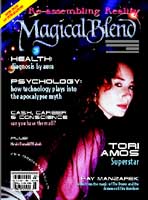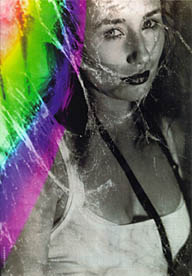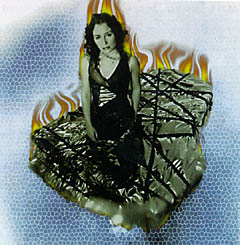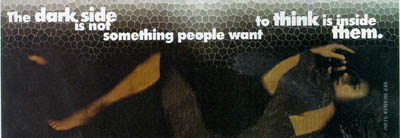
|
Magical Blend Magazine
|

|
Magical Blend Magazine
|
 Tori is on the cover of Magical Blend Magazine, Issue #63. (It says on the magazine to display through January 1999.) The full article is below. The Magical Blend web site
Tori is on the cover of Magical Blend Magazine, Issue #63. (It says on the magazine to display through January 1999.) The full article is below. The Magical Blend web site![]() says the magazine "documents the most exciting adventure of our time, the Cultural Creatives' quest for meaning in contemporary times." In additon to the cover photo there are some enhanced photos inside along with a 4 page article where Tori talks about spirituality. Thanks to Lamia, FioTo and Liza Prokop for informing us, and to Beth Winegarner, who sent me the article and the photos you see below which were in the magazine.
says the magazine "documents the most exciting adventure of our time, the Cultural Creatives' quest for meaning in contemporary times." In additon to the cover photo there are some enhanced photos inside along with a 4 page article where Tori talks about spirituality. Thanks to Lamia, FioTo and Liza Prokop for informing us, and to Beth Winegarner, who sent me the article and the photos you see below which were in the magazine.
The table of contents says this about the article:
"Tori Amos has established herself as one of the brightest stars on the music scene. Her secret? Talent, insight, and a unique spiritual vision."
It's A Free Will Planet: An Interview With Tori Amos
By John Patrick Gatta

On June 2, 1994, the Washington D.C. Rape Crisis center presented Tori Amos with a Visionary Award for her "significant work that brings us closer to a world free from all forms of oppression and sexual violence." Helping herself and others to stop identifying With the role of victim is crucial to Tori. With the release of from the choirgirl hotel following her three consecutive RIAA platinum releases (Little Earthquakes, 1992; Under the Pink, 1994; and Boys for Pele, 1996). She remains established as one of the most strikingly gifted vocalists and songwriters of the decade.
Joined by a band consisting of long-time collaborator Steve Caton on guitar, Matt Chamberlain on drums, bassists George Porter Jr. (Meters), and Justin Meldal-Johnsen (Beck), and programmer Andy Gray, this latest album -- recorded in Cornwall, England in a 200-year-old barn converted into a studio -- finds Tori with more than just her piano. Accompanied on stage by Caton and Chamberlain, with Jon Evans on bass, Tori Amos tours with a full band for the first time ever.
In this interview with Magical Blend, the inspired visionary and minister's daughter speaks of her own musical evolution as well as the evolution of world religion.
What emotions and events went into recording from the choirgirl hotel?

Tori Amos: I was quite excited at the time because I was going to be a mom and take some time off, but then I miscarried about three months into the pregnancy. It was a shock -- one of those situations where the days seem like years. First of all, your hormones are crashing. You can't go back to being the woman you were, and yet you're not a mother either, and you're still connected to this spirit. It was Christmas, and it was a really devastating time, but the songs started to come soon after that-I think the first one was "Pandora." It was a strange time for me. Yet when I listen to the record, it's not depressing, because I appreciate life in a way I really hadn't thought about before.
A miscarriage is such a difficult thing to go through, yet it sounds like it was healing for you and your music.
Tori Amos: Some people say motherhood changes you and for me, non-motherhood really changed me. When you lose a baby there's a line that's been crossed by the deities. I started to question the universe. And since I live on the river, I started to watch the rhythm of the water. After I miscarried I was trying to find something to identify with as a woman, because I didn't feel very confident at that point-it's a pretty helpless thing to lose a baby. I had to find some primal feminine place inside myself to really understand that the Earth has both birth and loss every day. As I felt all the different rhythms that the Earth produces, I started to see rhythm in way I really hadn't before. As I went to the piano, I knew now that it had to be written and built into the structure. It wasn't something to be put on top of the songs later.
A lot of critics are very dismissive about how you feel about the
invisible world. How did your Cherokee grandfather influence your belief
system?

Tori Amos: I think he instilled in me that spirit is in all things. I've always believed that. I was sort of brought up by my grandfather until he died when I was nine-and-a-half. It was a real natural way of looking at life, though I've come to realize that some people don't see it that way. So all of a sudden, I become the odd one.
What role do your dreams and intuition play in your music, if any?
Tori Amos: I don't really remember everything that I dream about. I used to get into writing it down, but I've lived in England too long-I've become cynical and stopped recording my dreams (laughs). With intuition, you're either a tracker or you're not. And I've always tried to improve those skills where you have to think like a Yorkshire terrier and kind of smell where that little lamb is. You use your toolbox, because you've got to know where that two-bar phrase is leading you. You have millions of choices, and you've got to know when you've got it right.
In the press release for choirgirl hotel, you mention that the songs came to you in droves. Do you see them as spirit guides that lead you forward as an artist and a person?
Tori Amos: Well, I've always said that the songs exist independently of me, and I just run into them because of something that has happened. And when I weave the tale, I use language that's on my plate at the time. I think that certain events open windows to other worlds and feelings. Sometimes those are thrilling and joyous events, and sometimes they're not. Certain events really test your mettle and show you a feeling, such as a depth of anger, that you didn't know you had. That's when, as a writer, you are working with textures that you might not have had when you were just riding around in your truck eating an ice cream cone.
As the daughter of a minister, do you ever feel misinterpreted or inappropriately judged by the public in expressing your unorthodox views and philosophies?
Tori Amos: Some Christians come up to me on the street and say, "How could you?" Well, I was really quite interested in Jesus' teachings, but as I studied them, I saw how his teachings got twisted. I felt like Christianity had hijacked some really great principles. The Germans are being held accountable for what happened in the Holocaust, but nobody here wants to be held accountable for what happened to the Native Americans under Christianity's watch. Christianity has a huge dark side, and the dark side is not something people want to think is inside them. They think it's some little guy in a red suit with horns, you know?
Can the current Christian era, which has left women out for thousands of years, adapt to the future?
Tori Amos: Absolutely, but it has to acknowledge dark side. I think the greatest thing that the Christians could do is say, "You know, we cut out sexuality and made it a bad thing, and we divided the Mary." We have to honor both Mary Magdalene and the mother Mary. The mother Mary was a sexual being who had children through sex. Mary Magdalene had great wisdom; she wasn't just the whore of Babylon. People have a really hard time seeing that the sword was used, in my opinion, as a penetration weapon. They kept conquering with the sword, in the name of the Lord.
So the past 2,000 years could largely be chalked up to sexual frustration?
Tori Amos: It's also the division of your emotional, physical, intellectual, and spiritual beings. Many religions want to keep us divided from all keep us divided from all our beings, because that's how they control us. One of my music teachers once said to me, "The student must surpass the teacher or the teacher really hasn't understood the role." The religions have to want the people to not need them anymore.
How has your musical vocabulary, as far as listening to other singers and songwriters, made a transition over the past few years?
Tori Amos: I think I am reliant on the people around me to bring me stuff that I wouldn't know about. I have really good friends in my life who have no problem coming to me and saying, "Sit down and listen to this." I've been exposed to a lot over the past couple of years. You catalog it in your mind and think, "Wow, I didn't really think about an instrument being used like that before." You get people who are really into ambient music and people who are into drumming. Even the over-forty, ecstasy, female crowd that comes in with Middle Eastern chanting -- you get a lot coming through this room.
How do you get other musicians to deliver what you want?
Tori Amos: When you're in a studio, for example, and you've got a bunch of musicians and nobody's inspired and nobody's getting it right, you have to give them anchors that give them another point of view as to who they are at that minute and what their instrument is in the song at that minute. That's when you have to read other people's hidden personalities. A lot of times, you're sitting there talking to a very passive musician who's not connecting with the piece, because he won't allow himself to bring out the personality capable of connecting with it. Sometimes you've got to use your brain and figure out how to get him to see this without offending him.
Beyond music and your new life -- marriage, new album, new tour -- what else in life excites and impassions you?
Tori Amos: I've been racing my boat lately. It's really small -- fourteen feet. I'm trying to learn the skill of taking waves and weaving in and out of the water. I just love being out on the water and having all of these massive boats pass by and get me all wet. I did something a couple of days ago that was totally humbling. I went out into the big ocean in my tiny little boat because it was very calm. And it was such a good feeling. I'm a bit cynical about religious deities right now, but sometimes you go out to the ocean and it's really simple, "Ocean ... big." In a sense, your faith gets restored because if a storm kicks up, then a storm kicks up. It's not personal. With religions, I was taught if you do x, y, and z and you confess and you pray and you ask to be absolved and you do all these things, then God will respond. And that's a lie. There's no guarantee that God will do anything. I'm really learning it's a free will planet and certain things are going to happen to certain people. No matter how loving you are or giving you are, you might face loss-tragically. And there's no "get out of loss free" card, just because you go to church.
Beyond expressing personal struggle and releasing feelings, what message do you want your music to communicate to the world?
Tori Amos: Society gets set up in a way that there are the creative people and the noncreative people, but everybody has access to the creative force. You might express it in a way that's very different from how people think you should do it, but I really encourage people to find that voice. To me, everybody is like a fragment of the Divine. That's what I try to put out there, even though certain fragments of the Divine that I want to fucking shoot ... (laughs).
Would it make someone more whole to share their music, as opposed to just experiencing the beauty for themselves?
Tori Amos: If you're going to share it, then people can have an opinion and you have to be open to those opinions. It can be quite cruel out there. When people cut me up, it never feels good, but you can't control anybody else and you have to make peace with that. I feel if I'm doing my job correctly, it's going to make you feel certain things, but I've found that some people don't really want that out of music, and I've had to respect that they really just want to be entertained.
John Patrick Gatta is a widely published freelance writer living in Warren, Ohio. He can be reached by e-mail at jpgl6@aol.com.
Please give me feedback, comments, or suggestions about my site. Email me (Michael Whitehead) at mikewhy@iglou.com![]()